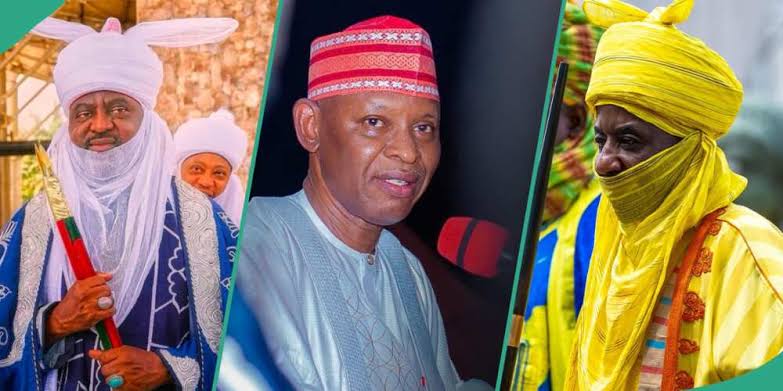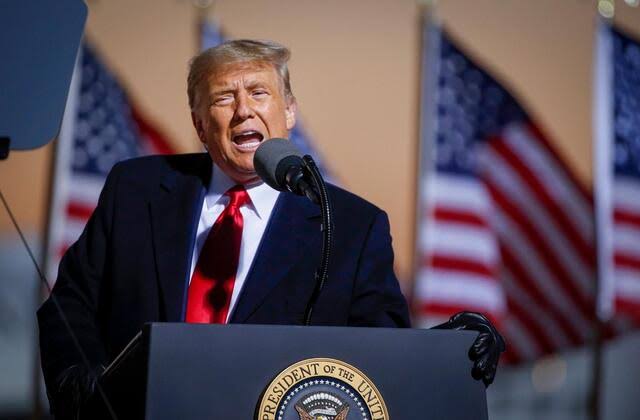News
Drama as Bayero’s lawyers withdraw from Kano Emirship tussle case

By Francesca Hangeior
Mr Abddul Muhammed SAN and other counsel for the 15th Emir of Kano, Aminu Ado-Bayero, in the ongoing Kano emirship tussle, have withdrawn their legal services before the State High Court.
The applicants in the matter are the Attorney General of Kano State, the Speaker Kano State House of Assembly, and the Kano State House of Assembly.
The applicants, through their counsel, Ibrahim Isah-Wangida, filed a motion ex parte dated May 27.
They are asking the court to restrain Ado-Bayero and four other dethroned emirs of Bichi, Rano, Gaya, and Karaye from parading themselves as emirs.
The respondents are Ado-Bayero, Alhaji Nasiru Ado-Bayero Bichi Emir, Dr Ibrahim Abubakar ll, emir of Karaye, Alhaji Kabiru Muhammad-Inuwa, Emir of Rano and Alhaji Aliyu Ibrahim-Gaya, Emir of Gaya.
Others are the Inspector General of Police, Director of State Security Service, Nigeria Security and Civil Defence Corps, and Nigeria Army.
When the case came up for hearing, counsel for Ado-Bayero, Muhammed, informed the court that he had an affidavit of fact dated July 3, attached with a notice of appeal and a motion of stay of proceedings.
He urged the court to stay proceedings, pending the hearing and determination of the motion at the appeal court.
“We were served with the court processes this morning by the applicants,” he said.
He sought an adjournment to enable them to respond, but the court refused to grant his prayers.
“My Lord, myself, and other counsel representing the first respondent apply for the withdrawal of our legal services and appearances,” he said.
Counsel for the third, fourth, and fifth respondents, Hassan Tanko-Kyaure, moved his application for an extension of time dated July 2 and counter affidavit in response to the originating motion.
Council (Repeal) Law 2024, adding that due process was not followed.
Tanko-Kyaure also urged the court to dismiss the applicant’s application with a cost of N1 billion.
Counsel for the Inspector-General of Police, Mr Sunday Ekwe, told the court that he had nothing to present, adding that they left everything to the discretion of the court.
Responding, counsel for the applicant, Mr Eyitayo Fatogun, urged the court to discountenance the respondent’s affidavit of facts pursuant to Order 39, Rules 1 and 2 of the court.
He said, “The motion refers to a proposed notice of appeal not a notice of appeal. It shows that the affidavit of facts is just to delay the proceedings. My Lord, the business of today is for the hearing of all pending applications.”
Fatogun urged the court to dismiss the third, fourth and fifth respondents’ applications on the issue of Kano Emirate Repeal Law because the issue is not before the court.
Earlier, delivering a ruling, Justice Amina Adamu-Aliyu refused the application for stay of proceedings filed by the respondent.
‘The respondent did not disclose any special fact to warrant any stay of proceedings” Adamu-Aliyu said.
The judge adjourned the matter till July 18 to rule on an application for extension of time, notice of preliminary objection, setting aside ex parte order, joinder application, and judge to recuse herself among others.
Recall that the court had on May 27, granted an order of interim injunction restraining the first, second, third, fourth and fifth respondents by themselves, servants, and privies, from parading themselves as Emirs in the interest of peace in Kano.
News
Trump announces judicial nominees, accuses US court of obstruction

United States President Donald Trump has announced a fresh slate of judicial nominees in a series of posts on Truth Social on Tuesday.
The president, who has repeatedly expressed frustration over what he sees as judicial obstruction, followed up on Wednesday with a post criticising the judiciary for allegedly preventing him from carrying out the mandate of the American people.
The Republican leader, whose second-term agenda has encountered multiple judicial roadblocks, wrote: “Our Court System is not letting me do the job I was Elected to do.
“Activist judges must let the [Donald] Trump Administration deport murderers, and other criminals who have come into our Country illegally, WITHOUT DELAY!!!”
Trump named Maria Lanahan, Missouri’s Principal Deputy Solicitor General, as a nominee for a judgeship on the US District Court for the Eastern District of Missouri. He praised her as “a true patriot” in a post on Tuesday.
The 78-year-old also nominated Judge Cristian Stevens to serve on the same court, describing him in another post as “a Great Patriot.”
The announcements came a day after a federal appeals court declined the Trump administration’s request to revoke temporary legal status from hundreds of thousands of Nicaraguans, Venezuelans, Haitians, and Cubans living in the United States.
News
FCT doctors call off strike

The Association of Resident Doctors, Federal Capital Territory Administration, ARD-FCTA, has officially suspended its three-day warning strike.
President of ARD-FCTA, Dr George Ebong, confirmed the development to DAILY POST on Wednesday.
According to him, the decision to suspend the industrial action followed an emergency virtual recess meeting held by members of the association.
The resolution comes in the wake of the FCTA’s reinstatement of previously dismissed health workers and the payment of a portion of their outstanding salaries.
Dr Ebong further disclosed that the administration had pledged to address the remaining unmet demands.
He commended the Minister of the FCT, Nyesom Wike, and his team for their intervention.
“We called off the warning strike after some of our demands were met. Most of our members have received their unpaid salaries and have been reinstated.
“We strongly hope that the rest of the members affected are paid by tomorrow to prevent further disruption of work in the health sector.
“We thank the FCT Health Dr. Adedolapo Fasawe, mandate secretary, and Chidi Amadi, Chief of Staff to FCT Minister Wike, for their swift intervention,” he said.
Recall that the ARD-FCTA embarked on the strike on Tuesday, paralysing healthcare services across public hospitals in the nation’s capital.
On Wednesday, the Medical and Dental Consultants’ Association of Nigeria, MDCAN, and two other unions joined the action in solidarity with the resident doctors.
News
Black smoke signals no pope elected in first conclave vote

Black smoke billowed from the chimney of the Sistine Chapel on Wednesday evening, signalling an inconclusive first vote by cardinals locked in the Sistine Chapel in a conclave to elect a new pope to guide the Roman Catholic Church.
Thousands of faithful gathered in St. Peter’s Square waiting for smoke to pour from a narrow flue on the roof of the chapel at the end of a day rich in ritual and pageantry, with prelates praying for divine guidance in their secret ballot.
The crowds had to be patient as it took longer than expected for the smoke to appear, more than three hours after the start of the conclave. This was an hour more than it took for smoke to be seen after the first vote in the 2013 conclave that picked the late Pope Francis.
When a pope is chosen, white smoke will emerge, but this had not been expected on Wednesday – a pontiff has not been picked on the first day of a conclave in modern times.
However, some cardinals said this week that they hoped to wrap things up by Thursday or Friday to show the Church can remain unified after the often divisive, 12-year papacy of Francis, who died last month.
The 133 cardinal electors, who are all aged under 80, will spend the night secluded in one of two Vatican guesthouses – where they can continue their deliberations in a more informal setting before returning to the chapel on Thursday morning.
Following Wednesday’s single round of voting, the red-hatted “princes of the Church” will hold two votes in the morning session and two in the afternoon, continuing in coming days until one man has secured a majority of at least two-thirds – 89 cardinals this time around.
Their only communication with the outside world will be the smoke from the chimney as they burn their completed ballot papers mixed with special chemicals – black when a voting session ends with no result, white when a pontiff is elected.
Modern papal conclaves are typically short. The 2013 conclave lasted just two days, likewise in 2005 when his predecessor, Benedict XVI, was picked.
In recent days, cardinals have offered different assessments of what they are looking for in the next pontiff who will lead the 1.4-billion-member Church.
While some have called for continuity with Francis’ vision of greater openness and reform, others have said they want to turn the clock back and embrace old traditions. Many have indicated they want a more predictable, measured pontificate.
‘GOOD OF THE CHURCH’
In a sermon ahead of the conclave, Italian Cardinal Giovanni Battista Re, who at 91 is too old to take part in the vote, told his fellow prelates they must set aside “every personal consideration” in choosing the new pontiff and keep in mind “only … the good of the Church and of humanity”.
He also suggested the next pope had to respect diversity within the Church. “Unity does not mean uniformity, but a firm and profound communion in diversity,” he said.
Some ultra-conservatives had branded Francis as a heretic, accusing him of being too welcoming to the LGBT community, too accommodating to Protestants and Muslims and too open on a range of topics, including offering communion for the divorced.
No clear favourite has emerged, although Italian Cardinal Pietro Parolin and Filipino Cardinal Luis Antonio Tagle are considered the front-runners.
However, if it quickly becomes obvious that neither can win, votes are likely to shift to other contenders, with the electors possibly coalescing around geography, doctrinal affinity or common languages.
Among other potential candidates are France’s Jean-Marc Aveline, Hungary’s Peter Erdo, American Robert Prevost and Italy’s Pierbattista Pizzaballa.
A record 133 cardinals from 70 countries entered the Sistine Chapel, up from 115 from 48 nations in the last conclave in 2013 – growth that reflects efforts by Francis during his 12-year reign to extend the geographical reach of the Church.
Among their considerations will be whether they should seek a pope from the global South where congregations are growing, as they did in 2013 with Francis, from Argentina, or hand back the reins to Europe, or even pick a first U.S. pope.
Latin chants and organ music accompanied the cardinals as they processed into the frescoed Sistine Chapel before the conclave began, with Michelangelo’s depiction of Christ delivering the Last Judgment dominating the 500-year-old room.
They laid their hands on the Gospels, taking a vow of secrecy not to divulge anything about their gathering.
Archbishop Diego Ravelli, the Vatican’s master of ceremonies, then pronounced the Latin command “Extra omnes!” (Everyone out!) telling those not involved in the gathering to leave the room, with the chapel’s heavy wooden doors slamming shut on the outside world.
There is not meant to be any discussion in the voting sessions but past experience suggests there will be plenty of covert campaigning during breaks and meals as the names of “papabili” rise and fall in successive ballots.
-

 News18 hours ago
News18 hours agoReal cause of Herbert Wigwe’s helicopter crash revealed
-

 Politics20 hours ago
Politics20 hours agoUghelli North PDP Holds Crucial Meeting
-

 News16 hours ago
News16 hours agoJust in: Security and Exchange Commission declares PWAN as PONZI scheme, cautions Nigerians
-

 News14 hours ago
News14 hours agoJust in: Lagos LG chairman slumps during APC meeting
-

 Economy19 hours ago
Economy19 hours agoSEE Black Market Dollar to Naira Exchange Rate Today – 7th May 2025
-

 News10 hours ago
News10 hours agoJust in: Finally, EFCC bows to pressure, releases VDM
-

 News18 hours ago
News18 hours agoFG starts massive overhaul of NYSC scheme, plans teachers’, medical corps
-

 News15 hours ago
News15 hours agoMultiple video evidence against Nnamdi Kanu






